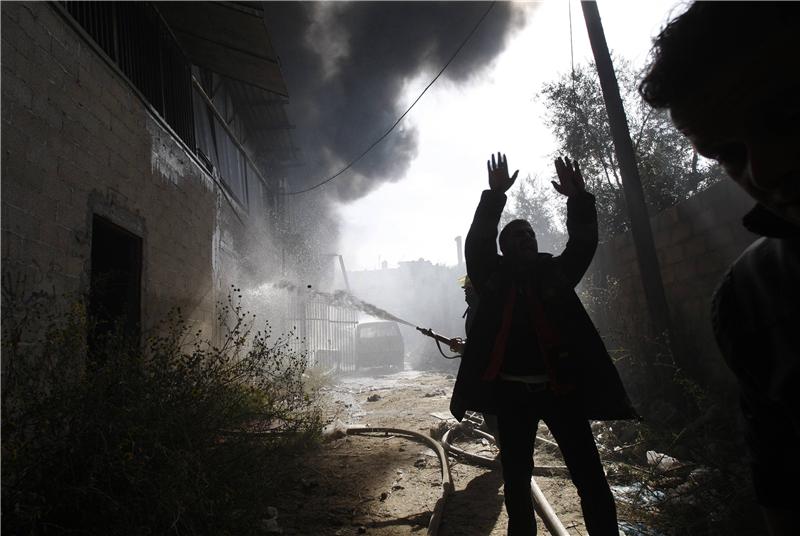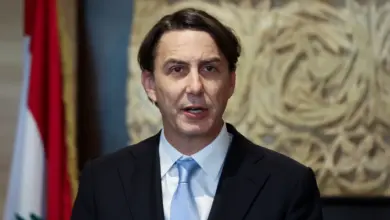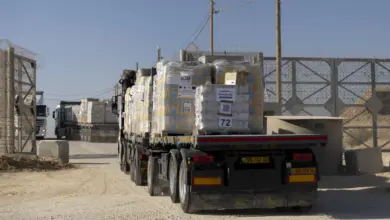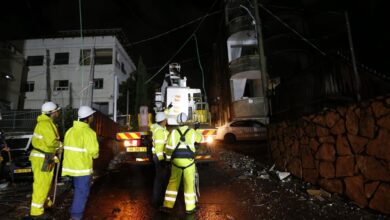
Israel's surprise hit on Hamas's top military commander in Gaza may have enraged the enclave's Islamist rulers, but analysts said it was unlikely the movement would respond in a way which would lead to all-out war.
Israeli commentators say that the green light for Wednesday's targeted killing of Ahmed Jaabari was given by Israeli Prime Minister Benjamin Netanyahu and his ministerial Forum of Nine the day before, as both sides appeared to settle into an unofficial truce after a three-day flare-up.
Apparently convinced that Egyptian efforts to broker a truce had calmed the situation, the Popular Front for the Liberation of Palestine (PFLP) and the radical Popular Resistance Committees had, on the same day, vied to claim responsibility for a weekend attack on an army jeep had sparked the fighting.
Then came Israel's strike on a car in central Gaza City, killing Jaabari on the orders of Netanyahu and his defense minister, Ehud Barak.
The strike was a bolt from the blue, carefully camouflaged by "a disinformation maneuver that involved not only the military and security officials, but also senior cabinet ministers," said the left-leaning Haaretz newspaper.
"The goal was to lull Hamas and other terror organizations in Gaza into a false sense of security, in the hope that they would lower their level of preparedness for an Israeli attack," it added.
Statements made on Tuesday by Netanyahu and Barak, it said, had created the impression that a major operation was off the table, with Israel saying it would choose an "appropriate time" to respond to Gaza rocket fire.
And shortly after Netanyahu met with his Forum of Nine, cabinet minister Benny Begin, who has a reputation for honesty, told Israeli radio stations he believed the latest round of violence was over.
The staged atmosphere of calm "brought Jaabari and his friends out of their holes and made possible the surprise attack," military analyst Alex Fishman wrote in the Yediot Aharonot daily.
"It seems that Jaabari thought that Israel was serious about the ceasefire and he decided to go out," said Mukhaimer Abu Saada, professor of political science at Al-Azhar University in Gaza.
"Israel set a trap for Hamas when it indicated that it was going to abide by the ceasefire."
"Jaabari was very cautious in all his travels and made a practice of not appearing in public and staying away from the media," said Ghazi Hammad, deputy foreign minister in Gaza's Hamas government.
"Israel deliberately presented a message of peace and security."
Yediot's Fishman said Israel's "boldness in the choice of targets was meant to force Hamas, more quickly, to face the ultimate dilemma: respond or retreat."
"Israel also has no interest in toppling Hamas," he wrote, stressing that the Jewish state's goal was to stop rocket fire from Gaza, although it could resort to a ground offensive to achieve that if necessary.
"Israel has succeeded in creating a dilemma for Hamas: either total confrontation or a truce according to new rules," said Naji Sharab, a Gaza-based political scientist.
"Hamas has much to lose in a total war, which explains its limited response," he said referring to the barrage of more than 380 rockets fired across the border, which on Thursday killed three Israelis and injured 19.
Abu Saada also thinks it unlikely that Hamas will respond in a way that could "provoke Israel into a ground operation against Gaza right now, which might cost Hamas its government and its regime here in the Gaza Strip."
"Hamas could just absorb this assassination, as in many cases in the past," he said. "They can turn to their constituency and say: 'We retaliated, we launched missiles, we killed a number of Israelis.'"
But on Thursday evening, a rocket landed in the sea near Tel Aviv in what was the furthest distance travelled by a projectile fired from Gaza.
Although the rocket fire was claimed by Hamas's smaller rival, Islamic Jihad, it nonetheless raised fears Israel could step up its campaign and embark on a ground operation.
Ephraim Halevy, former head of Israel's Mossad spy agency, recently said that if "Hamas emerges beaten and weakened," Israel must "extend its hand … in an attempt to engage in practical talks to achieve quiet for both sides."
Otherwise, he warned, "the only thing that we will have gained is a temporary increase in the intervals between one round of violence and the next."




